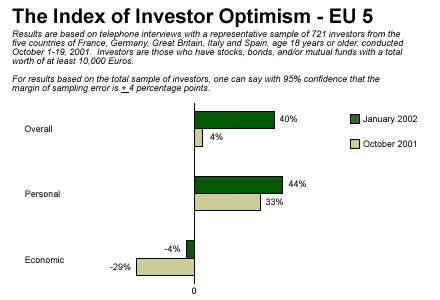As the Federal Open Market Committee meets this week to review U.S. interest rates, there is a lot of positive economic news. In particular, new UBS/Gallup "Index of Investor Optimism" data* show a surge in investor optimism in both the U.S. and Europe in January 2002. Add to this the rapidly improving consumer confidence numbers, and it becomes clear that expectations among investors and consumers of an economic recovery are much higher now than they were just a few months ago.
Of course, while improving investor expectations make it more likely that we will see an economic upturn in the coming months, expectations alone are not likely to generate a complete recovery. Investors are soon going to have to experience some real economic improvements to support their growing optimism. In this regard, the news is not as good. The Fed's recently released "Beige Book" survey shows that economic activity remained weak from late November into early January. Further, Gallup surveys show consumers reporting little clear evidence of an economic upturn as recently as the first weeks of the new year.
Given this level of economic uncertainty, it is somewhat surprising that efforts to further stimulate the economy seem to be losing ground. For example, Fed Chairman Alan Greenspan seemed to make a reversal in his testimony last week (Jan. 24) before the Senate Budget Committee. He was much more positive about the economy than he had been two weeks earlier in San Francisco, leading many to believe that the Fed will not be cutting rates again anytime soon.
Unfortunately, it seems that today's expectations-based optimism is so contagious that it has spread to our economic policy-makers. Instead of assuming the economy will get stronger, the Fed should build on the current surge in investor optimism by continuing to lower interest rates. And Congress should be adding its support with some type of economic stimulus package. Even the European Central Bank (ECB) could help support the growing optimism among investors in Europe by being more accommodating, although this may be the least likely place for support to materialize.
Although January 2002 investor optimism is up sharply from October 2001, it is still far below its pre-recession levels. More importantly, the current economic downturn is a capital investment/profits-generated recession -- not an investor/consumer-driven one. If U.S. and European policy-makers do not support today's growing optimism in the near-term, they risk seeing it not only dissipate, but resume its pre-Sept. 11 plunge into pessimism as the year unfolds. This could turn the current "mild" recession into something much worse.
Investor Optimism Also Surging in Europe
The new UBS/Gallup "Index of Investor Optimism -- EU5" shows that investor optimism is also surging in Europe. The EU5 Index reached 40 points this month, an increase of 36 points from its October 2001 level. Over this same period, the U.S. Index increased 29 points, going from 86 in October 2001 to 115 in January 2002. As was the case in the U.S., the biggest part of the increase in the European Index came in the Economic Dimension, which increased from -29 in December 2001 to -4 in January 2002. The Personal Dimension of the EU5 Index increased to 44 points in January -- up 11 points from October 2001.

Investor Optimism Is Contagious
The "Index of Investor Optimism -- EU5" combines with the "Index of Investor Optimism -- U.S." to allow us to track changes in investor sentiment on a comparable basis in two parts of the world. Over time, this should provide us with many new insights into both the similarities and differences in investor opinions in the U.S. and Europe.
In the immediate term, the results of the two indices show that investor optimism may well be highly contagious between the U.S. and Europe. This is no surprise, but it does reinforce recent comments by Greenspan suggesting that the world economy handled the economic shock of Sept. 11 very well. Importantly, it also suggests that investor optimism in any global sector deserves support, as it is capable of spreading across the world. The alternative could well be a highly contagious form of investor pessimism, and all the economic ills that would accompany it.
* Results are based on interviews with 1,001 U.S. investors, aged 18+, conducted Jan. 1-15, 2002, and approximately 200 investors each in France, Germany, Great Britain, Italy, and Spain conducted Jan. 2-13, 2002.
